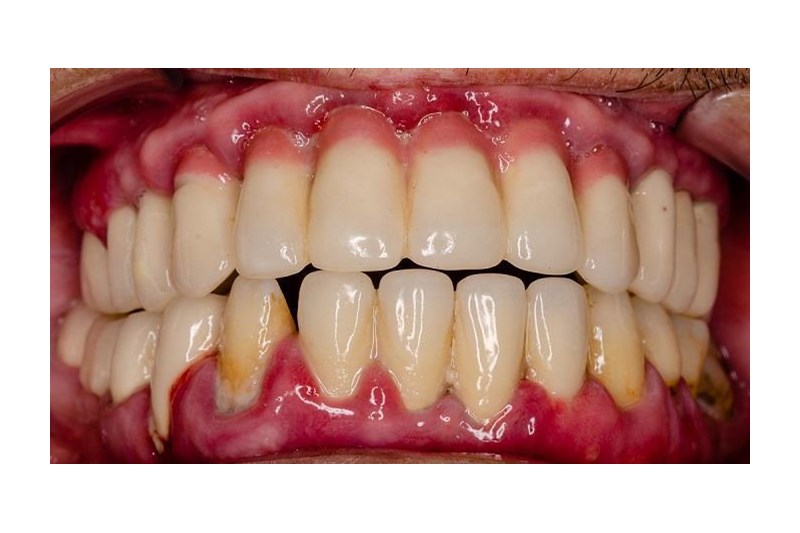Gum disease increases risk of other illness such as mental health and heart conditions
Published: 21/12/2021
A University of Birmingham-led study shows an increased risk of patients developing illnesses including mental ill-health and heart conditions if they have a GP-inputted medical history of periodontal disease.
The study, which was the first of its kind, examined GP records of 64,379 patients who had a GP-inputted recorded history of periodontal disease, including gingivitis and periodontitis. Of these, 60,995 had gingivitis and 3,384 had periodontitis. These patients’ records were compared to those of 251,161 patients who had no record of periodontal disease. Across the cohorts, the average age was 44 years and 43 per cent were male, whilst 30 per cent were smokers. Body Mass Index (BMI), ethnicity and deprivation levels were also similar across the groups.
Reporting on the study, media outlet Eureka Alert explained, “The researchers examined the data to establish how many of the patients with and without periodontal disease go on to develop cardiovascular disease (e.g., heart failure, stroke, vascular dementia), cardiometabolic disorders (e.g., high blood pressure, Type 2 diabetes), autoimmune conditions (e.g., arthritis, Type 1 diabetes, psoriasis), and mental ill-health (e.g., depression, anxiety and serious mental illness) over an average follow-up of around three years.
“From the research, published in BMJ Open, the team discovered that those patients with a recorded history of periodontal disease at the start of the study were more likely to go on and be diagnosed with one of these additional conditions over an average of three years, compared to those in the cohort without periodontal disease at the beginning of the research.
“The results of the study showed, in patients with a recorded history of periodontal disease at the start of the study, the increased risk of developing mental ill-health was 37 per cent, whilst the risk of developing autoimmune disease was increased by 33 per cent, and the risk of developing cardiovascular disease was raised by 18 per cent, whilst the risk of having a cardiometabolic disorder was increased by seven per cent (with the increased risk much higher for Type 2 diabetes at 26 per cent).”
Co-first author, Dr Joht Singh Chandan, of the University of Birmingham’s Institute of Applied Health Research, said, “Poor oral health is extremely common, both here in the UK and globally. When oral ill-health progresses, it can lead to a substantially reduced quality of life.
“However, until now, not much has been known about the association of poor oral health and many chronic diseases, particularly mental ill-health. Therefore, we conducted one of the largest epidemiological studies of its kind to date, using UK primary care data to explore the association between periodontal disease and several chronic conditions.
“We found evidence that periodontal disease appears to be associated with an increased risk of developing these associated chronic diseases. As periodontal diseases are very common, an increased risk of other chronic diseases may represent a substantial public health burden.”
Co-first author, Dr Dawit Zemedikun, of the University of Birmingham’s Institute of Applied Health Research, said, “Our study was the most comprehensive study of its kind and the results provided vital confirmation of evidence which has previously either been lacking in strength or has had gaps – particularly the association between oral ill-health and mental ill-health.”
Co-senior author, Professor Krish Nirantharakumar, also of the University of Birmingham’s Institute of Applied Health Research, said, “An important implication of our findings is the need for effective communication between dental and other healthcare professionals to ensure patients obtain an effective treatment plan targeting both oral and wider health to improve their existing overall health and reduce the risk of future illness.”
Periodontal specialist, Dr Devan Raindi, of the University of Birmingham’s School of Dentistry, said, “This study strengthens the continually evolving research associating periodontal disease, in particular periodontitis, and various general health conditions. It reinforces the importance of prevention, early identification and treatment of periodontitis and the need for members of the public to attend regular oral health checks with a dentist or dental care professional.”
The research was partly funded by Versus Arthritis’s Centre for Musculoskeletal Ageing Research based at the University of Birmingham, and supported by the National Institute for Health Research (NIHR) Birmingham Biomedical Research Centre.
Caroline Aylott, head of research delivery at Versus Arthritis, said, “Some of the biggest challenges of arthritis, especially auto-immune conditions like rheumatoid arthritis (RA) which affects 400,000 people in the UK, is being able to know who is more at risk of developing it, and finding ways to prevent it. Previous studies have shown that people with RA were four times more likely to have gum disease than their RA-free counterparts and it tended to be more severe. This research provides further clear evidence why healthcare professionals need to be vigilant for early signs of gum disease and how it can have wide-reaching implications for a person’s health, reinforcing the importance of taking a holistic approach when treating people.”
The research was carried out in collaboration with the University of Oxford, Birmingham Dental Hospital, the University of Warwick, Newcastle Upon Tyne Hospitals NHS Foundation Trust, Newcastle University, and Sandwell and West Birmingham NHS Trust.
Author: N/A









.jpg?width=150&height=100&scale=canvas)



